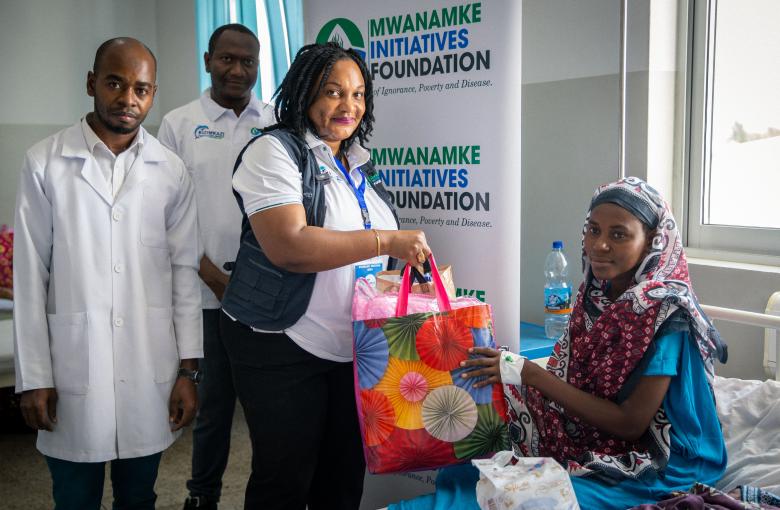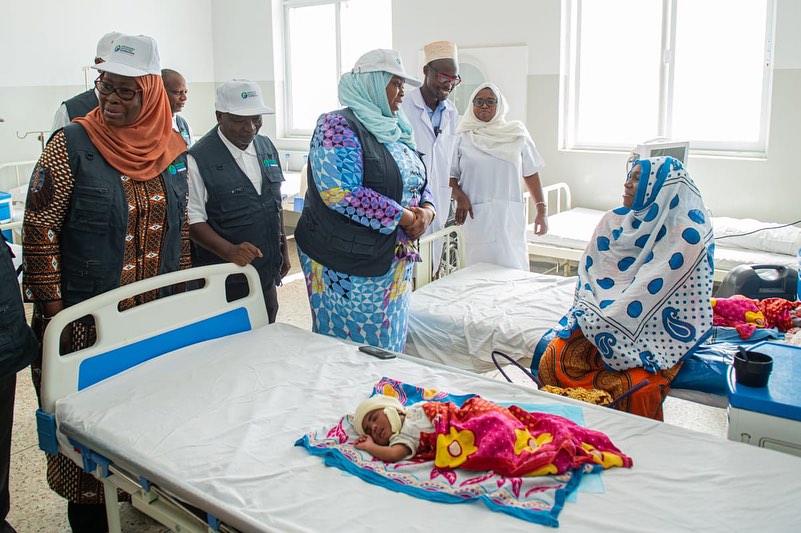
At our health program, we are dedicated to enhancing mental health and psychosocial support, as well At our health program, we are dedicated to enhancing mental health and psychosocial support, as well as improving maternal and newborn health. Our goal is to provide comprehensive care, treatment, and psychosocial support to address mental health challenges among women and youth in Zanzibar. To achieve this we adopt a multifaceted approach, focusing on strategic networking and partnership to optimize resources and prevent duplication. For more information on our strategic approaches, interventions, and key activities, please get in touch with us.
Our Mental Health sub-program
Through the Mental Health sub-program, MIF focuses on providing care, treatment, and psycho-social support to alleviate mental health problems among women and youth in Zanzibar. We strategically promote mental well-being in the general population, quality improvement of mental health services support victims of mental health and gender violence, and return to normal life through our linked poverty alleviation strategies.
Mental health is among the public health concerns, and there is limited public knowledge and understanding of it. To this, MIF creates awareness of Mental Health among leaders, influential persons, and the community at large to explain types, manifestations, effects, and management of mental health. We also strive to reduce the prevalence and incidences of gender-based violence (GBV) and violence against children (VAC) events in families, communities, workplaces, and schools.
The investment in these efforts is rooted in the fact that GBV and VAC lead to trauma and psychological stresses and ultimately manifest in many forms of mental health distress. According to the Tanzania Demographic Health Survey (TDHS, 2022), 30% of women aged 15–49 have experienced physical or sexual violence. This includes 19% who have experienced only physical violence, 4% who have experienced only sexual violence, and 8% who have experienced both physical and sexual violence. Additionally, 27% of women aged 15–49 have experienced physical violence since age 15, and 12% have experienced sexual violence in their lifetime. The prevalence of spousal physical, sexual, or emotional violence among ever-married women decreased from 50% in 2015 to 39% in 2022. The percentage of women who have experienced physical violence since age 15 also decreased from 39% in 2010 and 40% in 2015 to 27% in 2022.
The World Health Organization (WHO) urges that there is an urgent need for mental health and psychosocial support for individuals affected by gender-based violence (GBV) and violence against children (VAC). Despite ongoing efforts to enhance physical health and reduce poverty in countries like Tanzania, mental health issues have frequently been neglected. Mental health disorders, such as depression, pose a significant global burden, particularly among adolescents, impeding their educational advancement. Various factors, such as substance abuse and traumatic experiences, contribute to mental health challenges, especially among women, young adults, and the unemployed.
We understand that by creating awareness of the problem, we will likely create demand for mental health services. MIF ensures that the health system is prepared to meet such demands by working with the Government and other partners to improve mental health-related infrastructure and service delivery facilities (centers/ facilities/equipment & medicine).
Our Maternal and Newborn Health Sub-program

Maternal health constitutes a second component of our health program. T is an inevitable agenda in most of Sub-Saharan Africa and so is Tanzania as a whole and Zanzibar in particular. The importance of consolidated and concerted efforts to respond to health system and community-based challenges that impair the provision and utilization of maternal health services cannot be overemphasized.
Maternal mortality is the most important indicator reflecting the quality of maternal health care for any health system. In Tanzania, the maternal mortality ratio for the 7 years before the 2022 TDHS-MIS is estimated at 104 maternal deaths per 100,000 live births. Under-5 mortality decreased from 67 to 43 deaths per 1,000 live births between the 2015–16 TDHS-MIS and the 2022 TDHS-MIS. Over the same period, infant mortality declined from 43 to 33 deaths per 1,000 live births. Despite some notable improvements, the magnitude of maternal health challenges is quite sizeable.
Many factors are associated with the low quality of maternal health services in Zanzibar. Some of these factors include system factors such as a limited share of the health budget directed to maternal health services which doesn’t meet the requirement and demand. Similarly, the quality of maternal health services is also crippled by a critical shortage of skilled human resources for health. Stock out of supplies and medicines is common while infrastructure development and service delivery equipment are also on the list of factors hindering the availability of quality maternal health services.
Zanzibar is experiencing a high unmet need for family planning, rated at 28% indicating limited services and choices of family planning methods for those in need. There is also limited availability of youth-friendly sexual and reproductive health services (SRH) which is common in most service delivery points. There are also weak linkages between the health system and the community. Community-based service delivery is still underdeveloped and the functioning of the Community Health Workers is not well widespread and optimal. As a result, there is a missed opportunity to implement early detection of pregnancy among the general population in Zanzibar which is credibly known for its effectiveness in positive pregnancy outcomes and hence reducing maternal complications and ultimately maternal deaths.
MIF implements the Maternal Health sub-program in response to the complexity of the above-explained social. Community and system challenges. To implement its maternal health program, MIF employs diverse approaches and interventions. A primary focus is strategically networking and engaging with partners to optimize resources and efforts while preventing duplication. Our efforts are directed primarily on quality improvement through capacity building of health personnel, infrastructure development and digitalization of the health system, service delivery by ensuring that the system can meet the demand for reproductive and maternal health, and community engagement by developing innovative and participatory interventions for awareness and demand creation, promotion of family planning, early booking for antennal care, facility delivery, and postnatal care. Similarly, MIF works with the health system to ensure that adolescents' sexual and reproductive health services and rights are well embedded in service delivery across the Isles.
For more information on our strategic approaches, interventions, and key activities in the health program, please get in touch with us.



